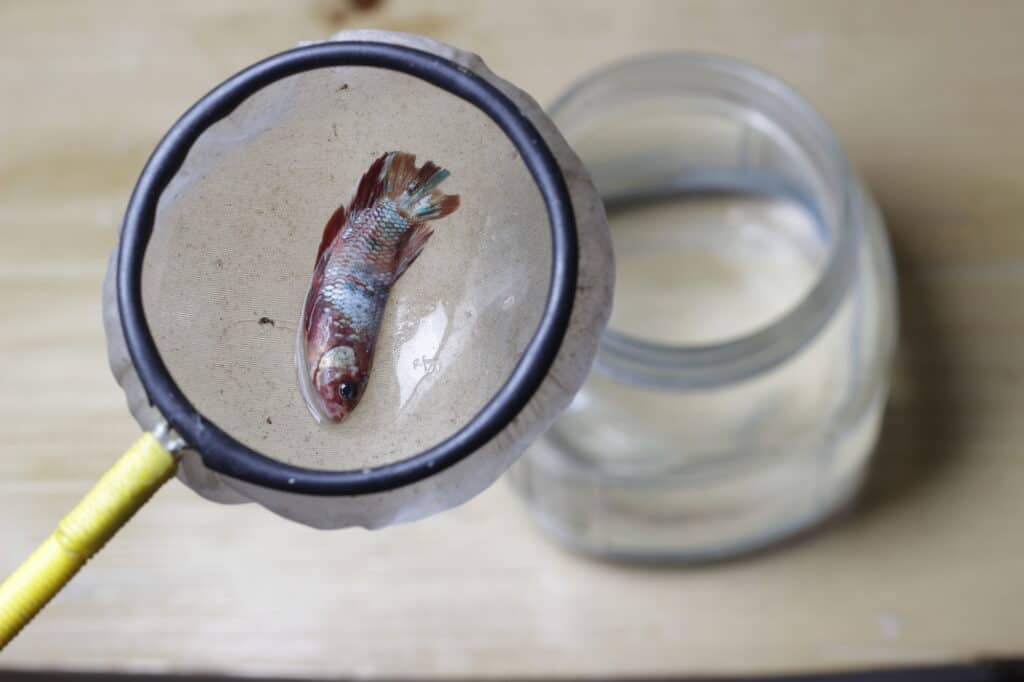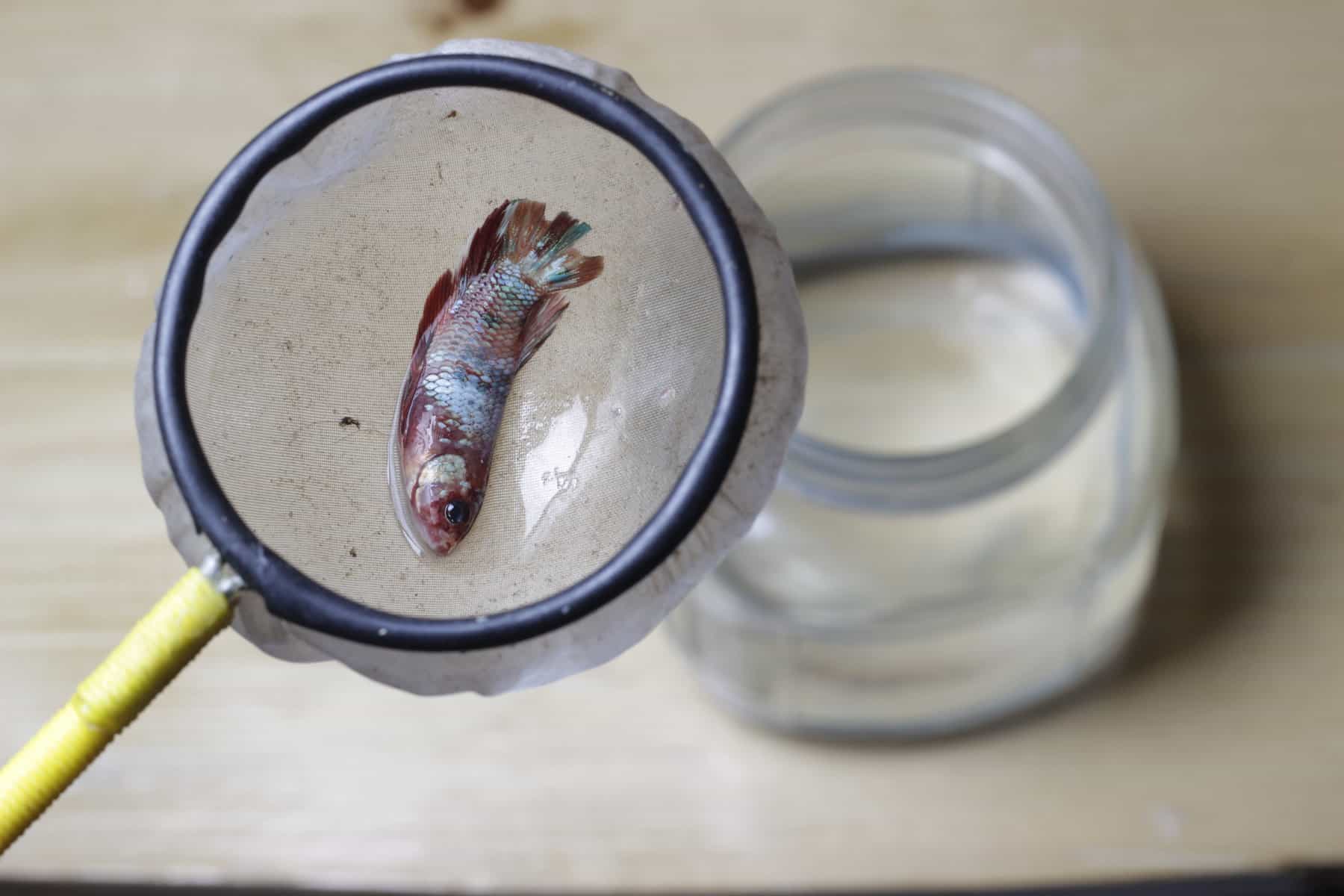My betta fish looked like he was on death’s door for ages before he finally died of old age while I was on vacation. I wish I would have known what the signs were, so I could have said goodbye — or even done something to intervene.
Our team at Betta Source doesn’t want you to suffer the same fate, so we have put together a list of signs to look out for.
If you understand a betta’s behavior before death, you may be able to help them — or at least say goodbye before they pass.
Signs Your Betta Is Dying:
Loss of Appetite
Healthy betta fish have voracious appetites, so if your fish is not eating, it is a sign that something is wrong.
Keep track of how much you feed your fish and how much it eats.
If your fish isn’t eating, you can try to give them a treat, like bloodworms. If your betta rejects the treat or continues to reject food for several days, call a veterinarian.
For younger fish, a decrease in appetite could be a sign of illness.
For older fish, however, not eating may be a sign that your fish will die soon.
Change of Color
Bettas have bright, beautiful colors that can change according to their mood.
If your fish is dying or unhealthy in some way, their colors may dull, as well.
A betta will naturally experience color fading as it gets older.
Once again, color change is something to worry about in younger fish, but it may be a sign of aging in older fish.
In addition, bettas that are old or near death display several other physical characteristics. Let’s examine these below:
Other Visible Signs To Be Aware Of
Weight Loss
In addition to changing color, your betta may become weaker. Without food, your betta will start to metabolize the fats in its own body.
In other words, your betta may wither away before it dies.
Change in Shape
Some bettas also experience a curved or hunched back before they die. This is a normal part of aging and a sign that your betta might be near the end of its life.
Swelling
Older bettas may also swell up before they die or experience eye problems.
While swelling in the eyes or body (dropsy) can be a sign of aging or death, you should still try to treat it because it’s uncomfortable for your fish.
Please call a veterinarian, especially if any of these physical changes are occurring in a younger fish.
Your Fish Is No Longer Responding to You
Betta fish are deeply curious, and some say they can even recognize their owners.
If your betta fish is getting older and stops responding to you when you come into the room, it may be a sign that death is near.
Older bettas also have a slower reaction time and will stop interacting with or responding to items inside and outside of their tank.
Younger bettas losing their sense of sight, smell, or hearing is a telltale sign of ammonia poisoning, so intervene immediately if your fish stops responding to you suddenly.
Your Fish Has Started Hiding
Like other creatures, betta fish want to die in peace and privacy. When they are old and vulnerable, they will start hiding more often, and they may even die in their favorite hiding spot.
If you notice your betta fish hiding more often than usual, it may be a sign that their time has come.
Your Fish Is Sleeping More
When the vitality of youth fades, your betta fish will have less energy and spend more time asleep.
Sometimes, a sleeping betta fish can also look like it’s playing dead, so watch for signs of breathing before disturbing your fish.
If your fish won’t wake up for food or stir when you turn on the lights, it may be a sign of lethargy.
Again, if a young fish is lethargic, call your veterinarian, but if an old fish is lethargic, let it rest and start preparing your goodbyes.
Your Betta Is Gasping at the Surface of the Tank
Older betta fish may have a hard time breathing, so they often go to the top of the tank to use their labyrinth organ.
If you notice your betta gasping at the surface of your tank, check your water parameters, just in case. You may also want to introduce more oxygen to your tank using a filter, air stone, or live aquatic plants.
Whatever you do, make sure the flow rate in your aquarium stays low because a strong current could stress your fish out, which is the last thing you want if your betta is sick or aging.
Your Fish Seems Stressed or Depressed
Elderly betta fish are especially vulnerable to stress and depression.
Bettas can also die when stress builds up over time.
Therefore, to keep your betta from getting stressed and depressed, maintain ideal water parameters, and keep your tank clean with partial water changes.
Also, avoid tapping on the glass, adding tankmates, or making any sudden changes to your fish’s environment.
Try to keep your fish as comfortable as possible at the end of its life, and do your best to prevent stress in younger bettas.
What Factors Affect a Betta Fish’s Lifespan?
Believe it or not, you can have a huge impact on your betta’s lifespan. The following factors can affect your betta’s lifespan:
- Water quality
- Water temperature
- Tank size
- Diet
- Habitat
- The cleanliness of your tank
- How you clean your tank
- The strength of your betta’s immune system
- How quickly problems are addressed
For a healthy fish, do your best to maintain ideal water conditions and avoid full water changes or other behaviors that might stress your fish out.
Only introduce appropriate tank mates and try to match your betta fish’s natural habitat. Make sure your fish has a healthy diet with plenty of variety, as well.
Keep in mind that even if you do all this, your fish will likely die from old age within 5 or 6 years anyway. Accept that death is a natural part of life for your betta buddy, too.
What Causes Bettas to Die?
Betta fish are hardy fish and they don’t die easily. Still, some actions and illnesses can cause your betta to die.
Bettas may die of old age, but they may also die of the following:
- Ammonia poisoning
- Parasites
- Fungal infections
- Swim bladder disease and other illnesses
- Overeating
- Aggressive tank mates
- Extreme stress or serious injury
Fortunately, most of these causes can be prevented with good fish keeping. For example, if you keep your tank clean and monitor your water parameters, your betta won’t die of ammonia poisoning.
Additionally, healthy bettas have strong immune systems and are less vulnerable to parasites, fungi, and disease.
Further, if you notice a problem in your fish and fix it promptly, your fish can survive many ailments.
When in doubt, always call a veterinarian.
How Long Does It Take for a Betta Fish To Die?
On average, betta fish live to be 2 to 4 years old. When it’s your betta fish’s time to go, however, they usually don’t stick around for very long.
Most fish keepers report that their betta fish die within 2 or 3 days of exhibiting the common behaviors, signs, and symptoms we’ve discussed in this blog.
Also, betta fish can only go without food for about a week, so if your betta fish has stopped eating entirely, it only has a week or so left.
If your betta sticks around longer than this, it may be time to euthanize your fish. At the very least, you should take steps to provide comfort to your betta fish before death.
How Do You Comfort a Dying Betta Fish?
To keep your betta comfortable, make sure it has a clean, calm tank with plenty of places to hide.
You may also want to keep the water temperature warmer than usual and add a little bit of aquarium salt to reduce swelling and suffering.
Why Did My Betta Fish Die Suddenly?
When betta fish die suddenly, it’s usually related to their water parameters. Ammonia or nitrites may build up in the tank and kill your fish, or your fish could go into shock due to a sudden temperature change.
Sadly, many bettas die when their owners first get them due to the stress of the move, combined with an unfriendly environment.
Bettas may also be killed suddenly by inappropriate tankmates or even sustain life-threatening injuries during a fight.
Your betta can also die suddenly due to stress or infection, but these problems usually build up over time. Therefore, keep an eye on the common betta fish behavior and signs that indicate your betta’s health (or lack thereof).
Keep an Eye on the Signs
If your betta fish loses its physical flair and its affinity for life, it’s probably on its way out. At the very least, your betta is sick and needs immediate veterinary attention.
Watch your fish’s behavior for signs of impending death. If you have a young fish, get help while you still can.
However, if you have an older fish, make sure your tank is clean and comfortable and give your fish the easiest transition possible.

